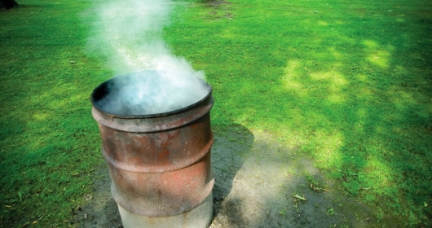
In Minnesota, backyard burning of garbage is still common, though it's illegal for most homeowners. Local units of government play a critical role in educating Minnesota residents about the risks of burn barrels and changing their disposal practices. We offer resources that can assist you.
Burning household garbage in burn barrels, stoves, and fire pits creates pollution. These types of low-temperature fires produce lots of smoke, carbon monoxide, carbon dioxide, nitrogen oxides, and smaller amounts of more poisonous chemicals such as benzene, dioxins, lead, and mercury.
U.S. EPA research shows that burn barrels are the number one source of dioxin in the U.S. Just one burn barrel can produce as much or more dioxin as a full-scale municipal waste combustor burning 200 tons/day. Dioxin is a potent human carcinogen that is especially harmful to pregnant women, children, and the elderly.
- Facts about dioxins (MN Dept. of Health)
- Dioxins produced by backyard burning (U.S. EPA)
Sample editorials
Sample no-burn resolutions for county boards
A few counties in Minnesota have formally banned garbage burning at the local level, where garbage service is reasonably available to all residents. Enforcing laws against burning is easier for police and other enforcement officers when all burning of municipal solid waste is banned.
This sample resolution is an actual county resolution that bans all burning and burial of garbage. It is only intended as an example; modification would be needed.
Burn barrel buy-back program
The buy-back program is based on successful efforts by Minnesota counties to reduce the use of burn barrels. Your county can use the same steps:
- Monitor and record all complaints from residents about neighbors' burn barrels. Work with applicable local governments and laws and develop a procedure for responding to complaints.
- Use gathered data to persuade the county board to pass a ban on garbage burning and burying, if you don't yet have one.
- Notify offenders that burning garbage is illegal and that they must use local garbage services instead.
- Meet with garbage haulers in your county to get their input and assistance. Every former garbage burner is a potential new garbage service customer for the haulers. Will they offer a discounted rate for garbage burners who are willing to give up their burn barrels? If so, you've got a burn barrel buy-back program!
- Create partnerships and share your educational materials with them to get the word out.
- Haulers, the police, and other enforcement staff can get the word out to customers. Can first-time offenders avoid a fine if they agree to participate in the buy-back program?
- Your county health department can help educate residents about the health risks associated with garbage burning.
- The fire warden could pass along educational materials to residents seeking burning permits.
- Township officers can get the word out to rural residents.
- Promote the program through news releases and local ads. Create inserts for the county property tax statements. Set up displays at home shows and county fairs.
- Send informational letters to all county residents with five or more acres of land, who are presumably the most likely to burn or bury their garbage.
- Measure and report the changes that your efforts make.